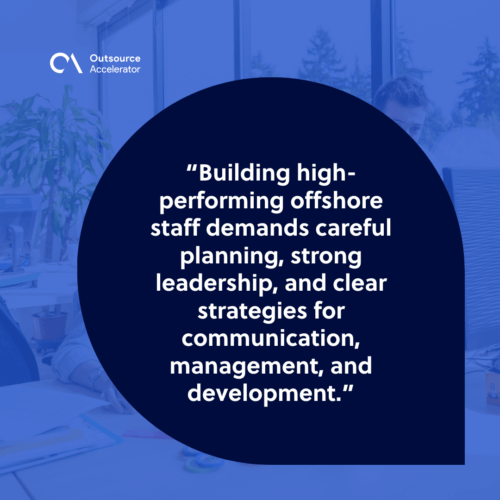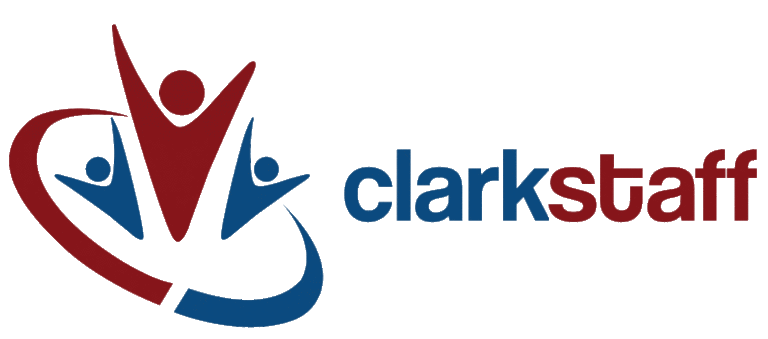6 best practices for building effective offshore staff teams

Offshore staff have become a crucial part of global business operations. Companies are increasingly looking beyond their local talent pools to leverage the skills and cost advantages of remote professionals from different regions.
By harnessing the power of remote talent, organizations can build agile and high-performing teams to drive innovation, growth, and operational efficiency.
In the 509th episode of the Outsource Accelerator Podcast, Russell Meiselman, President and Co-Founder of Clark Staff, shares valuable insights on what makes an outsourcing relationship thrive.
This article explores the best practices needed for managing successful offshore staff.
What is an offshore staff?
Offshore staff refers to a group of professionals located in a different country from the company they work for.
These teams collaborate virtually to deliver services, complete projects, or support various business functions. These functions cover different services that can be done remotely, such as:
- Customer service
- IT support
- Software development
- Marketing
Offshore staff often work as an extension of the company’s in-house team, integrating with their processes and culture. Their success depends on effective communication, collaboration, and a shared understanding of business goals.
How to build a strong offshore staff team
Building high-performing offshore staff requires more than just hiring people from another country. It demands careful planning, strong leadership, and clear strategies for communication, management, and development.

Here are some best practices for building a team that delivers results:
1. Assess your business needs and goals
Understanding your business needs and goals is the foundation of building strong offshore staff. Identify the specific tasks or functions that could benefit from outsourced resources and evaluate the potential impact on your organization.
This step sets the stage for precisely defining the roles and responsibilities of your offshore staff members.
Russell believes that the model works best when more routine functions are outsourced.
“If you have a process that works and is repeatable, you get really consistent output.
Those are the processes and things that you want to outsource because that is already a well-defined process.”
This way, your resources can be put into more appropriate places.
2. Research and select the right offshore partner
Choosing the right offshore partner is crucial for the success of your remote team.
Extensive research into potential outsourcing providers is essential. One should consider factors such as experience, track record, cultural fit, and ability to meet your project or business requirements.
Establishing a strong partnership with your outsourcing partner is vital for fostering a collaborative and productive working relationship.
3. Develop a comprehensive onboarding and training program
Invest in creating a comprehensive onboarding and training program to support new offshore staff members. Provide detailed instructions, resources, and support to help integrate them seamlessly into your project or organization.
Clear communication and well-defined training processes are essential for equipping offshore staff members with the necessary knowledge and skills.
Russell emphasizes that there needs to be patience when beginning with outsourced team members, just as one usually gives with onsite employees.
“The piece is if you allow for the time to happen and that sort of knowledge to be transferred, that’s where people are seeing the most benefits from outsourcing.”
4. Implement robust project management practices
Effective project management is fundamental for coordinating tasks, tracking progress, and ensuring successful outcomes when working with offshore staff members.
Utilize established project management tools and methodologies to facilitate streamlined workflows, allocate resources efficiently, and monitor the performance of your remote team.
5. Maintain open and transparent communication
Establish and maintain open and transparent communication to ensure the success of offshore staff. Create a communication plan that outlines protocols, schedules, and channels for keeping everyone connected and informed.
Cultivate an environment where team members feel comfortable sharing updates, concerns, and ideas, fostering a culture of collaboration and mutual support.
6. Monitor and evaluate performance regularly
Continuous monitoring and evaluation of your offshore staff’s performance are crucial for identifying areas of improvement.
Conduct regular performance reviews, solicit feedback from team members, and address any issues or challenges promptly to optimize team efficiency and productivity.
It’s also important to have realistic expectations from the start so you can review performance properly. This is a challenge that Russell says they must frequently overcome.
“It’s the folks that are looking for a quick turn [or] easy fix is where I would say most of the negativeness around outsourcing stems from, those people going into it with unrealistic expectations.”
Benefits of effective offshore staff
When built and managed effectively, offshore staff can offer numerous advantages that can propel your business forward:
- Access to global talent – Offshore staff provide access to a diverse pool of talent, enabling companies to tap into specialized skills and expertise that may not be readily available locally.
- Cost savings – Leveraging offshore talent can result in significant cost savings, particularly in terms of labor expenses and operational overheads.
- Scalability – Offshore staff offer the flexibility to scale resources up or down based on project requirements, allowing businesses to adapt to changing needs more effectively.
- Operational efficiency – With the right strategies in place, offshore staff can enhance operational efficiency by streamlining processes and accelerating project timelines.
Start your offshore journey today
Building offshore staff may seem like a daunting task. However, by following these best practices, you can create a high-performing and effective team that supports your company’s growth.
Embrace the opportunities presented by offshore collaboration and position your organization for new levels of success.
Russell believes that more can be done when it comes to awareness of outsourcing.
“I don’t think there are enough people out there educating people with the realities of outsourcing and how to be successful at doing that appropriately.”
However, he’s hopeful that the practice will continue to grow.
“I think we’re definitely moving in the direction of a lot more people knowing about it [and] wanting to explore it, and excited to give it a shot.”

If you’re ready to take the next step in building your offshore staff, now is the perfect time to start. With the right strategies in place, your business can utilize the power of outsourced talent.
Get in touch with Clark Staff for their outsourcing solutions.







 Independent
Independent




